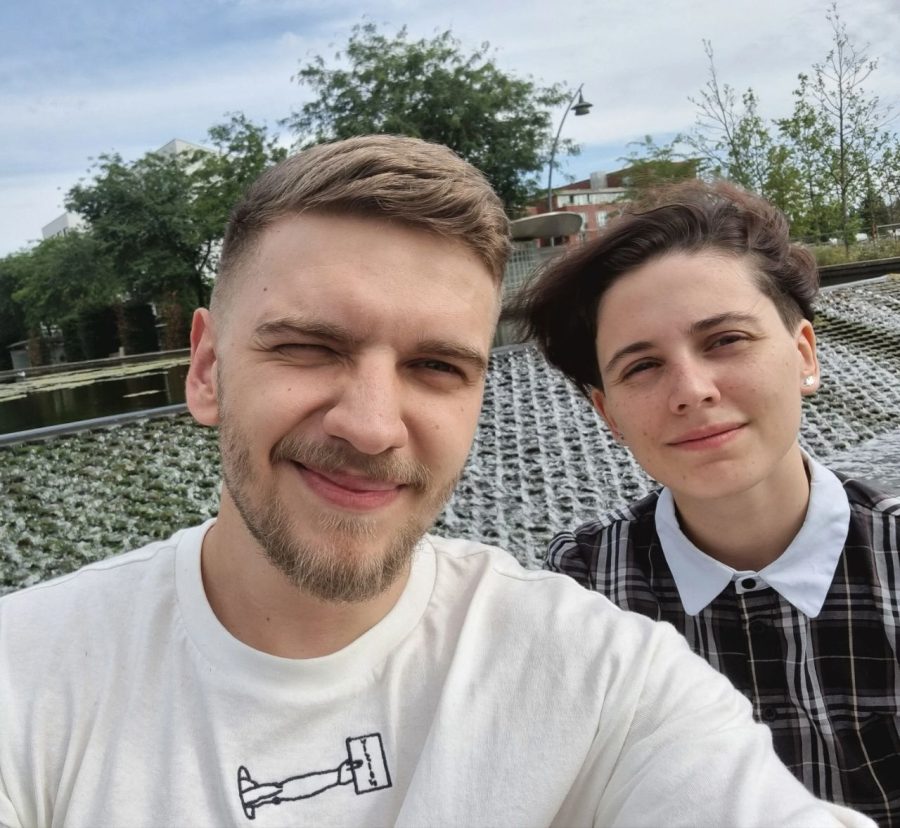What life is like for a young couple living in Ukraine during Putin’s Invasion
Andrii Zinevych (left) and Mariia Zinevych (right) pose for a photo together in Ukraine. This photo was taken on a trip to the Netherlands.
March 15, 2022
Andrii Zinevych is scared to leave his apartment. He worries that if he steps outside, he could be grabbed off the street and forced to join The Armed Forces of Ukraine. His wife, Mariia Zinevych, has just come back from a trip to the store. At least he can be with her.
This has been their life ever since Russia began its invasion of Ukraine on Feb 24.
Andrii, 24, and Mariia, 25, live on the western side of Ukraine in Lviv, near the border with Poland. In the beginning of Russia’s attack, the couple had to stay in bomb shelters at night as air raid sirens blared warnings of Russian planes overhead. The city was bombarded during the first couple of days when Russia was focused on a military academy nearby and is still bombarded every few days.
“Today we spent most of the night in the shelter, barely got any sleep. That was also the first night we personally heard explosions,” the couple said in a Discord post on March 14.
They recently moved to Lviv in western Ukraine from their hometown of Odesa in eastern Ukraine when they heard about Russian troops gathering outside the eastern border of Ukraine.
“Russia has been collecting their forces on our borders for many, many months, but no one really believed that Putin was going to do anything this stupid,” Andrii said. “We decided to move to another city just in case, like as far as possible from the Russian border and we turned out to be correct in doing so.”
They had planned to leave the country when the conflict started, but shortly after they finished packing to leave, the Ukrainian government banned men over the age of 18 from leaving. Even though Andrii has lung issues, he would still have to stay.
“They [Ukraine] enabled martial law and mobilized all forces and banned male citizens from leaving because even if you’re unsuited for military service, there are still a lot of … physical jobs that you can do,” Andrii said. “ So, they need you to stay,”
Andrii and Mariia are independent game developers. When the crisis began, they asked their supporters on Patreon, which is a way for fans to support artists with a monthly subscription, if they could send the couple any extra money they could spare. The support they got was beyond their wildest expectations. Normally their Patreon makes around $8,500 a month, after asking for help in February, they made $12,000 that month.
“I don’t think that I will be able to put in words how grateful we are for all this. But I’m not going to lie if I say I shed a tear,” Andrii said.
“Well, I straight up cried. It was an ugly cry,” Mariia added.
The two are using the extra money to help their family and friends still stuck in their hometown in the east to buy food, and hopefully, eventually, get out of the east.
“We already spent at least half of the money trying to help people here,” Andrii said.
“So, the money that we needed, that our families needed, that families of our coworker’s friends [needed]. A lot of people survived because of those,” Mariia added.
Their families lost their jobs and were given no payment and were just told to go home. They are not leaving their homes unless they need to and are donating clothes to the local militias. The families are very nervous as they are surrounded by gunfire and explosions constantly, the couple said.
“They’re managing. They’re fine.” Andrii said. “My mother is a little nervous. I also have a little brother she wants to send him to me, but it’s very hard to move in Ukraine right now because we have a lot of people who are trying to move to safe cities like ours,” Andrii said.
Andrii’s mother was finally able to send Arseniy Zinevych, his younger brother, out west to stay with Andrii and Mariia recently, they posted on their Discord. The rest of his family still lives back in Odesa.
The couple is planning to hold out as best as they can and are hoping for their family’s safety. For now, they must wait in their small apartment, listen to the radio and try to continue their work as best as they can.
Benjamin Weaver is a reporter. Contact him at [email protected].












